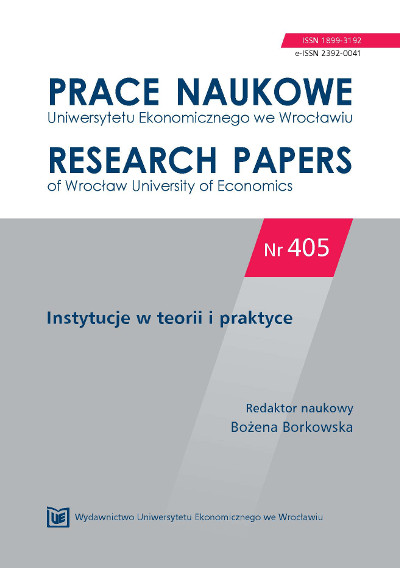Nowe mechanizmy dystrybucji środków finansowych z Europejskiego Funduszu Społecznego w świetle teorii kosztów transakcyjnych
New mechanisms of distribution of financial means from the European Social Fund in the light of the theory of transaction costs
Author(s): Marcin KępaSubject(s): Supranational / Global Economy, Economic policy, Welfare systems
Published by: Wydawnictwo Uniwersytetu Ekonomicznego we Wrocławiu
Keywords: transaction costs; voucher; European project; marketized services
Summary/Abstract: Civil service, responsible in accordance with the union politicians for the distribution of financial means from the budget of the European Union (the EU), to the domestic level, took a new initiative in frames of financial programming established for the years 2014–2020. Its aim is turning away the market trends on the level of the market of training services of developmental character (directed at the SME sector), by creating demand-induced systems in the process of the public aid. Stimulating the demand-induced side of the market of developmental services is a purpose of the enterprise with using new demand-induced mechanisms (vouchers and promises). The action will let, to the greater degree, judge the real demand on the training market and ”to privatize” the prices of provided services, awarding a bonus to the quality of the product. A research purpose is a presentation of the new, orientated to the maximization of the real demand, approach to public serving provided by the civil service, in the financial prospect of 2014–2020. The article presents institutional frames in which the distribution of these means will take place, and the meaning of the institution for the development of businesses stimulated by the public aid. The evaluation of the new mechanism of distribution of financial means in ESF will be conducted from a point of view of transaction costs and the theory of regulation. Theoretical background of the research will constitute the New Institutional Economy, which notional apparatus will be used for describing and explaining phenomena and economic processes bound with the expenditure of the union co-financing, directed to the development of the human capital in SMEs.
Journal: Prace Naukowe Uniwersytetu Ekonomicznego we Wrocławiu
- Issue Year: 2015
- Issue No: 405
- Page Range: 173-183
- Page Count: 11
- Language: Polish

